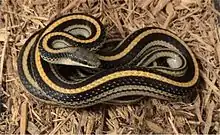Salvadora grahamiae
Salvadora grahamiae, also known commonly as the eastern patch-nosed snake and the mountain patchnose snake, is a species of snake in the family Colubridae. The species is native to the southwestern United States and adjacent northeastern Mexico.[2]
| Salvadora grahamiae | |
|---|---|
 | |
| Scientific classification | |
| Domain: | Eukaryota |
| Kingdom: | Animalia |
| Phylum: | Chordata |
| Class: | Reptilia |
| Order: | Squamata |
| Suborder: | Serpentes |
| Family: | Colubridae |
| Genus: | Salvadora |
| Species: | S. grahamiae |
| Binomial name | |
| Salvadora grahamiae | |
| Synonyms[2] | |
Etymology
The specific name, grahamiae, is in honor of Colonel James Duncan Graham, United States Army Corps of Topographical Engineers.[3]
Geographic range
S. grahamiae is found in Arizona, New Mexico, and Texas, and in the Mexican states of Chihuahua, Coahuila, Querétaro, Tamaulipas, and Veracruz.[2]
Habitat
S. grahamiae occurs in a wide variety of habitats including forest, savanna, shrubland, grassland, and desert, at altitudes from sea level to 1,980 m (6,500 ft).[1]
Description
S. grahamiae may attain a total length (including tail) of 47 in (120 cm). It has eight upper labials. The posterior chin shields touch or are separated by only one small scale.[4]
Diet
S. grahamiae preys predominately upon lizards, especialy those of the genus Aspidoscelis.[5] It also eats reptile eggs, small snakes, nestling birds, and small mammals.[6]
References
- Hammerson, G.A.; Frost, D.R. (2007). "Salvadora grahamiae". IUCN Red List of Threatened Species. 2007: e.T63911A12726058. doi:10.2305/IUCN.UK.2007.RLTS.T63911A12726058.en. Retrieved 6 July 2023.
- Species Salvadora grahamiae at The Reptile Database www.reptile-database.org.
- Beolens, Bo; Watkins, Michael; Grayson, Michael (2011). The Eponym Dictionary of Reptiles. Baltimore: Johns Hopkins University Press. xiii + 296 pp. ISBN 978-1-4214-0135-5. (Salvadora grahamiae, p. 105).
- Smith HM, Brodie ED Jr (1982). Reptiles of North America: A Guide to Field Identification. (Illustrated by David M. Dennis and Sy Barlowe). New York: Golden Press. 240 pp. ISBN 0-307-13666-3 (paperback), ISBN 0-307-47009-1 (hardcover). (Salvadora grahamiae, pp. 19–4195).
- Schmidt KP, Davis DD (1941). Field Book of Snakes of the United States and Canada. New York: G.P. Putnam's Sons. 365 pp., 34 plates, 103 figures. (Salvadora grahamiae, pp. 136–139, Figure 35).
- Stebbins RC (2003). A Field Guide to Western Reptiles and Amphibians, Third Edition. The Peterson Field Guide Series ®. Boston and New York: Houghton Mifflin Company. xiii + 533 pp. ISBN 978-0-395-98272-3. (Salvadora grahamiae, p. 357–358 + Plate 47, Figure 21 + Map 145).
Further reading
- Baird SF, Girard C (1853). Catalogue of North American Reptiles in the Museum of the Smithsonian Institution. Part I.—Serpents. Washington, District of Columbia: Smithsonian Institution. xvi + 172 pp. ("Salvadora Grahamiæ ", new species, pp. 104–105).
- Cope ED (1879). "Eleventh Contribution to the Herpetology of Tropical America". Proceedings of the American Philosophical Society 18: 261–277. ("Phimothyra grahamiæ ", new combination, p. 262).
- Powell R, Conant R, Collins JT (2016). Peterson Field Guide to Reptiles and Amphibians of Eastern and Central North America, Fourth Edition. Boston and New York: Houghton Mifflin Harcourt. xiv + 494 pp., 207 figures, 47 color plates. ISBN 978-0-544-12997-9. (Salvadora grahamiae, p. 37, Figure182 + Plate 37).
- Wright AH, Wright AA (1957). Handbook of Snakes of the United States and Canada. Ithaca and London: Comstock Publishing Associates, A Division of Cornell University Press. 1,105 pp. (in 2 volumes). (Salvadora grahamiae, pp. 246–249, Figure 188).
